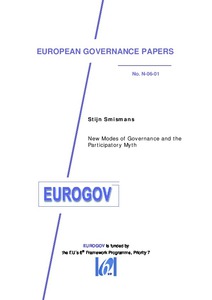New modes of governance and the participatory myth
"One of the most common arguments about ‘new governance’ is that it is characterised by heterarchy rather than by hierarchy, creating horizontal modes of governance among a multitude of actors – public and private – involving all relevant stakeholders. Often implicitly, but sometimes explicitly...
| Main Authors: | , |
|---|---|
| Institution: | ETUI-European Trade Union Institute |
| Format: | TEXT |
| Language: | English |
| Published: |
Vienna
2006
Eurogov |
| Subjects: | |
| Online Access: | https://www.labourline.org/KENTIKA-19187647124919058299-New-modes-of-governance-and-th.htm |
| Summary: | "One of the most common arguments about ‘new governance’ is that it is characterised by heterarchy rather than by hierarchy, creating horizontal modes of governance among a multitude of actors – public and private – involving all relevant stakeholders. Often implicitly, but sometimes explicitly, this argument is linked with a normative democratic claim that praises the particular participatory features of ‘new governance’ as compared to ‘old governance’. Using as a case study Community occupational health and safety policy, characterised by a clear shift from ‘old’ to ‘new governance’ since the 1990s, this paper warns us that one should be very cautious in making normative claims on new governance. More horizontal and heterarchical governance does not mean automatically more participatory governance in normative democratic terms. " |
|---|---|
| Physical Description: | 23 p. Digital |

